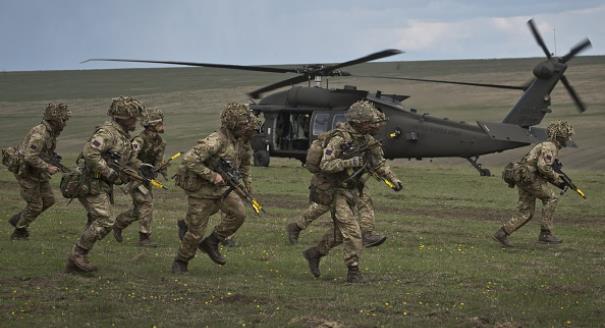But when it came to committing to upholding Article 5—the alliance’s sacred cow, which requires NATO members to defend an ally if it is attacked—the results were devastating. The Pew poll showed that among Europeans, a median of 49 percent of respondents thought their country should not defend an ally, a response that exposes a lack of commitment to collective defense. Not only that: the majority of Europeans (67 percent), with the surprising exception of the Poles (49 percent), believed the United States would come to the defense of its allies.
Despite war-weariness in the United States and Canada, these are the two countries that are willing to use force if Russia attacks a NATO ally. That was the view of 56 percent of Americans and 53 percent of Canadians. The United States is also proposing to store heavy weapons and equipment for up to 5,000 troops in Eastern Europe. What a commitment to NATO and to Europe.
Of the Europeans polled, the Brits were the most in favor of the use of force to defend their allies (49 percent). As for the Poles, of whom a whopping 70 percent saw Russia as a major military threat to neighboring countries, only 48 percent of those surveyed supported military action in case of an attack.
What that could reveal is that Poland’s decision in February 2015 to beef up its military spending to the equivalent of 2 percent of GDP was aimed at the country’s own defenses and was not particularly designed to strengthen NATO.
In addition, Poland now seems more interested in developing closer military cooperation with the Baltic states (also members of NATO) and with Finland and Sweden (nonmembers), rather than depend entirely on NATO. It’s as if Poland doesn’t completely trust NATO as a collective alliance, as the poll confirms. But the country doesn’t seem to trust the United States either.
Only the #US and #Canada are willing to use force if Russia attacks #NATO.
That aside, the biggest response against using force against Russia came from Germany. Only 38 percent of Germans, the lowest score among the eight NATO allies polled, would use force to defend an ally.
This seems to jar with Germany’s decision to become involved in training exercises in Poland. Germany has joined NATO’s Very High Readiness Joint Task Force, a spearhead force created in September 2014 that is to be deployed to Eastern Europe. Berlin intends to send 1,000 troops to a 5,000-strong brigade. Prior to its agreement to participate in this operation, Germany had opposed NATO deploying permanent bases in Eastern Europe. Maybe this is a compensation gesture.
If it is, then it calls into question statements by the German president, foreign minister, and defense minister about the need for the country to take more responsibility for security and to stop using the past as an excuse for passivity.
Bruce Stokes, Pew’s director of global economic attitudes, told Carnegie Europe that the survey results for Germany “suggest that the scars of the Cold War remain.” Older Germans, he said, were less likely than younger ones to be willing to confront the Russians.
And a generation after the country’s 1990 reunification, “Germany is still a divided country when it comes to public opinion. When it comes to Russia, Ukraine, and NATO, Germans in the former East just think differently than Germans in the former West,” Stokes added.
Yet Germany’s pacifism, its ambivalent relationship with the United States (including NATO), and a deep-seated Ostpolitik (or Eastern policy) based on cooperation with Russia all have an impact too.
Combined with the Pew findings, these traits and trends show the vulnerability of German Chancellor Angela Merkel’s policies. As the European leader who has rallied the EU behind sanctions against Russia and who is trying to support a very fragile ceasefire in eastern Ukraine, she has managed to carry the German public with her.
That support cannot be taken for granted. The Pew survey showed that only one in five Germans wanted more economic pressure applied to Moscow. And Germans (29 percent) are the most likely among the NATO allies polled to want to reduce the sanctions against Russia.
Overall, the depressing aspect of the Pew poll is how, once again, the Europeans take the United States as their security guarantor for granted. Why successive U.S. administrations tolerate this is hard to fathom. Europe is prosperous. It should be confident enough both to take care of its own security and to contribute to a greater role in burden sharing. It does neither.
Europeans have developed a sense of entitlement to U.S. #defense.
Furthermore, despite so many criticisms of the European allies from former U.S. defense secretaries, Europeans have developed a built-in dependence culture and a sense of entitlement to U.S. defense. Because they assume the Americans will come to their defense, why should the Europeans bother to build up a strong security and defense policy?
This is as shortsighted as it is dangerous for the transatlantic relationship. The longer the Europeans refuse to even consider the use of military force to protect their allies, the more NATO’s sense of collective defense and solidarity will weaken. The inexorable outcome is the demise of Article 5. What then is NATO for?











